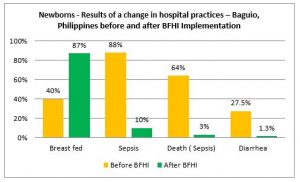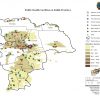Baby Friendly Hospital Initiative (BFHI) Summary Report
Global Strategy for Infant and Young Child Feeding;
The aim of the Global Strategy is to improve:
- Through optimal feeding – the nutritional status, growth and development, health, and thus the survival of infants and young children
- It supports exclusive breastfeeding for 6 months, with timely, adequate, safe and appropriate complementary feeding, while continuing breastfeeding for two years and beyond.
- It also supports maternal nutrition, and social and community support
Baby-Friendly Hospital Initiative (BFHI)
- The BFHI is a global initiative of the World Health Organisation and UNICEF that aims to give every baby the best start in life by creating a health care environment that supports breastfeeding as the norm.
- The Initiative was launched in 1991 and by the end of 2004 more than 19,000 health facilities worldwide had been officially designated Baby-friendly.
- The Initiative includes a global assessment and accreditation scheme that recognises the achievements of health facilities whose practices support breastfeeding and encourages health facilities with less than optimal practices to improve.
The aim of the Baby Friendly Hospital Initiative
To implement the Ten Steps to Successful Breastfeeding and to end the distribution of free and low-cost supplies of breast milk substitutes to health facilities.
Training Aims;
The aim of this course is that every staff member will confidently support mothers with early and exclusive breastfeeding, and that this facility moves towards achieving Baby-friendly designation.
The overall aim of the International Code of Marketing of Breast milk Substitutes is the safe and adequate nutrition of all infants.
- Skin to Skin Contact and Early Breastfeeding
- Kangaroo Mother Care
Newborns – Results of a change in hospital practices – Baguio, Philippines
- Before and after study: Before (1973-5) : separation and formula supplements
- After (1975-7): rooming-in from birth and exclusive breastfeeding
- No of Neonate in survey before BFHI 4720
- No of neonate in Survey after BFHI 5166

Highlights of the BFHI over the past 25 years World Alliance for Breastfeeding Action
Development of materials and training;
Training courses:
- 20-hour BFHI course for maternity staff & technical staff
- Administrators Course at least 2 hours
UNICEF Record Update 2006/7
- Total countries 198
- Total no hospitals/maternities – 74,286
- 154 countries have “ever designated” hospitals
- Number ever-designated baby-friendly 21,328
BDN BFHI Activities;
At the beginning of year 2017 MoPH/PND conducted BFHI ToT to all BPHS/EPHS implementer and set priority to all DHs and PH should be implemented BFHI policy and ten steps of successful breast feeding till the end of 2017.
Based on that BDN first conducted BFHI refresher training to all DH and PH staff and applied the BFHI
Policy and ten steps of successful breast feeding in all four projects;
- Balkh project BFHI program implemented in 5 DHs(Balkh ,Kholm, Shulgra, Dehdadi and Dawlat Abad DHs)
- Herat in 4 DHs( Shindand, Gozara, Ghoryan and Gulran DH)
- Baghlan in 2 DHs( Baghlan-e- Jadid and Nahrin DHs)
- Ghazni in 1 PH
The below activities have been done in BFHI HFs;
- Conducted training for all DHs & PH staff
- Balkh Project DHs ( 206 )
- Herat Project DHs ( 159)
- Baghlan Project DHs (140 )
- Ghazni PH( 60 )
BDN printed the following IEC materials for BFHI program:
- Exclusive Breast Feeding Poster
- Breast feeding poster attachment
- Breast feeding poster Positioning
- Complementary feeding posters
- Maternal Feeding posters
- Printed BFHI policy banners and ten steps of successful breast feeding
- Printed BFHI inauguration ceremony and sign board banners and certificate frame
- Printed BFHI guidelines for DHs ( 10 books for each HF)
Internal appraisal assessment were done by BDN staff and the external appraisal was done by PND colleagues, after that the certificates distributed by PND to all BFHI designated HFs
BDN organized inauguration ceremony in all projects and invite the local shura, government authority and PPHD representative on that ceremony.
BFHI ten steps ;
TEN STEPS TO SUCCESSFUL BREASTFEEDING A Joint WHO/UNICEF Statement (1989)
Every facility providing maternity services and care for newborn infants should:
Step 1. Have a written breastfeeding policy that is routinely communicated to all health care staff.
Step 2. Train all health care staff in skills necessary to implement this policy.
Step 3. Inform all pregnant women about the benefits and management of breastfeeding.
Step 4. Help mothers initiate breastfeeding within a half-hour of birth.
Step 5. Show mothers how to breastfeed, and how to maintain lactation even if they should be separated from their infants.
Step 6. Give newborn infants no food or drink other than breast milk unless medically indicated.
Step 7. Practice rooming in – allow mothers and infants to remain together – 24 hours a day.
Step 8. Encourage breastfeeding on demand.
Step 9. Give no artificial teats or pacifiers (also called dummies or soothers) to breastfeeding infants.
Step 10. Foster the establishment of breastfeeding support groups and refer mothers to them on discharge from the hospital or clinic.
Challenges
- Easier to implement steps based on management decisions (rooming in, avoiding supplements) than those requiring clinical skills (helping mother to attach baby at the breast)
- Some hospitals implement selected steps – limits benefits
- Good practices in hospitals not maintained: staff turnover and shortages, not all trained
- Problem to reassess growing numbers of hospitals
Difficult for hospitals to organize community support to sustain breastfeeding after delivery
For Complete report you can download from below link

